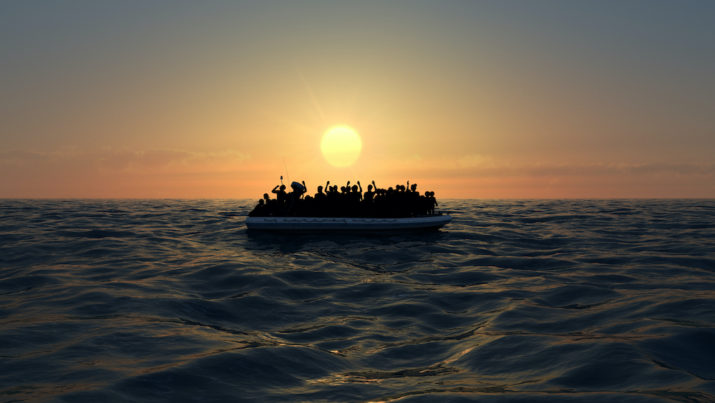

This is part of our special feature on European Art, Culture, and Politics.
The question of how cosmopolitan thought could be utilized politically, socially and culturally has been discussed from different perspectives in a number of disciplines and has led to a variegated understanding of contemporary cosmopolitanism. In their important collection, Conceiving Cosmopolitanism (2002), on its theory, context, and practice, Steven Vertovec and Robin Cohen outline four characteristics of a new cosmopolitanism. According to them, it transcends models of the nation state; it can establish links that mediate between the universal and the particular and, respectively, global and local actions and imaginaries; it is culturally anti-essentialist and capable of representing different, complex repertoires of allegiance, identity, and interest (4). While they suggest that it can be analyzed within different rubrics (socio-cultural, philosophical, etc.), for the purpose of this essay I am most interested in what Vertovec and Cohen call a practice or competence, and an attitude and disposition; in other words, an actually existing, “everyday,” or lived cosmopolitanism where diversity is accepted and rendered ordinary (5). Following Ulf Hannerz’s definition, this kind of lived cosmopolitanism is “the willingness to engage with the other… with an intellectual and aesthetic openness towards divergent cultural experiences” (239). But how is an everyday cosmopolitanism narrated, celebrated, or contested by and in cultural expression? The natural nexus that lived cosmopolitanism has to literature specifically is (real and metaphorical) openness. The common denominator lies in the respective rendering of imaginaries, in the interpretive modes of understanding diverse social, cultural, linguistic, and literary traditions without erasing cultural differences. Cosmopolitanism and literature both allow for nuance and share awareness of ethical responsibilities in light of the challenges globalizing processes have posed, especially in the second half of the twentieth century.
Cosmopolitanism today is no longer a privilege of world-travelling artists and elitist intellectuals. It has become a condition of life for migrants and refugees who are not a priori, i.e. by virtue of having citizenship, part of a nation state. Many of them are bilingual or multilingual, possess hyphenated identities and combine a range of allegiances and loyalties, positioning them within a cosmopolitan mindset. Yet, for large numbers of migrants who have left their birth places voluntarily or have been displaced due to wars and other struggles, cosmopolitanism is actually the fight between politically documented national belonging (citizenship) and a culturally determined, though not always documented belonging (citizenship sans papier) to old and new homelands (Mani 504). Consequently, narratives of mobility present a rich field for the analysis of cosmopolitan ideals and exchanges. They often explore and reflect on postcolonial, migrant, and refugee experiences, diasporas, and exile, as well as on the question of how immigrants live in European countries.
The following comparative readings shed light on the limits of cosmopolitan practices in contemporary German and French literature while paying particular attention to ideas of hospitality. Sherko Fatah’s The Dark Ship (2015; originally published in German in 2008) and Shumona Sinha’s Assommons les pauvres! (2011) vividly illustrate different stages of the migrant experience. While the former foregrounds the experience of flight from violent conflicts, the latter centers on the procedures and asylum regimes to which European nation states expose refugees. In both texts, the capacity to interact across cultural lines, the sine qua non of a lived cosmopolitanism, is shown to be hampered. In Fatah, cultural differences, specifically those based on ethnic and racial stereotyping and religious beliefs systems, loom large. In Sinha, the experience of deterritorialization creates permanently split identities that lead to alienation and violence. In these texts, Germany and France do not appear as societies where diversity is accepted and rendered ordinary, but as places that continue to advocate for politically and socially operational models of multiculturalism (Germany) and assimilation (France) over a lived cosmopolitanism.
Attempts to enter the EU loom large in narratives of refuge. Given established migration routes and limited economic means, the majority of migrants from Northern Africa and the Middle East attempt to reach Europe via the treacherous waters of the Mediterranean Sea, most often paying human traffickers to secure their route. The strongest passages in Fatah’s The Dark Ship portray these nightmarish adventures and looming dangers. The novel tells the story of the young Kurd Kerim, a Muslim who is part of the Alevi minority in Iraq. He and his family live on a major thoroughfare where they run a restaurant during the time of the Iran-Iraq War (1980-88) and the Persian Gulf War (1990-91). Shortly after two henchmen of Saddam Hussein’s secret police kill his father, Kerim is kidnapped by a group of armed “holy warriors,” a group of radicals that fight against the Kurdish militia in the region. After he manages to escape them, he decides to flee to Germany.
The middle part of the novel provides a harrowing illustration of illegal migration into the fortress that is contemporary Europe. Kerim is a stowaway on a freight ship en route to Europe that gives the novel its title. After a few days of fear and deprivation in the belly of the dark ship, Kerim and another illegal passenger, the Central African Tony, are discovered by the crew. They set both men adrift on a makeshift raft, which is already assembled, confirming that illegal passengers are discovered and set loose regularly. The captain of the ship declares his inhumane action a necessity in order to protect both himself and his ship: “You don’t understand the problem,” he said in a tired voice. He rubbed his mustache harder. “Nobody in Europe wants you. You are not welcome there. There are laws. We have to pay fines if we bring you along. A lot of money.” … “You don’t understand,” he said. “I’m also a poor man. I also have a family, children; many children.”[1] Even though stowaways and crew are similarly disenfranchised and Tony is pleading for his life, the captain does not change his mind. They are set afloat and get stranded on a deserted island. Of the two, only Kerim is rescued by fishermen and manages to continue on the Germany; Tony’s fate remains unknown to the reader.
Fatah’s text plays on the literary model of Robinson Crusoe and his servant, Friday, in the relationship between the two refugees. While Kerim is traumatized by having to leave Tony behind, he also displays a shocking lack of solidarity with his fellow man, for whom he has only loathing; he even fantasizes about killing him (DS 253). While his hatred is ostensibly due to the fight for scarce resources of water and food on a deserted island, it becomes clear that it is actually based on racism. Kerim feels superior because of his lighter skin tone and Middle Eastern origin, and attributes a slyness and shiftiness to Tony that is linked explicitly to his African lineage (DS 254). Tony’s liberal attitudes vis-à-vis sexuality, which Kerim had detected in stories about his previous life in Africa, further add to his racialized stereotyping. Yet, what Kerim fails to understand is that Tony’s supposed promiscuity is in fact based on sexual exploitation by white tourists from the West and intricately linked to the inequalities created by global capitalism (for a filmic rendering of these phenomena, see Ulrich Seidl’s 2012 haunting feature film Paradise: Love). Tony’s behavior is simply unacceptable to the devout Muslim Kerim and enhances his feelings of moral superiority. The encounter of the two men raises the question of whether being religious can actually be compatible with cosmopolitanism. Kwame Anthony Appiah, for example, describes radical globalized religious movements as paradigmatic examples of “counter-cosmopolitanism” (196). If we agree that cosmopolitanism requires transcendence of religion traditions and the acceptance of secularity, then any strong religious belief that veers towards fundamentalism, whether Christian or Muslim, poses a stumbling block for a range of cosmopolitan practices, such as the process of learning to accept difference and identify it as constitutive for one’s own identity construction (cf. Beck 2002).
The last part of the novel turns into a story of love and exile when Kerim, supported by his uncle Tarik, is granted political asylum in Germany after spending eight months in a home for asylum seekers in Berlin. The experience of the asylum process itself is hardly a focus here; the text mostly highlights the businesslike attitude of the German bureaucrats who process the asylum claims. They are impersonal, punctilious, and inseparable from the task at hand:
Here, the human and the authority could not be separated from one another … with his travel into Germany he had violated a law, one that was known to everyone but himself. (DS 266)
Of course, when entering any European country, asylum seekers come under the directive of not one single law, but a whole host of regulations both at the EU and at the national level.[2] So, the “law” here stands in for unknowable and ominous procedures reminiscent of Kafka’s parable Before the Law that remain opaque to both the petitioner and his uncle and serve de facto as a means of exclusion from mainstream German society. Yet, despite the fact that Kerim does not understand it, the law still works in his favor since he is given asylum against all odds. Consequently, he perceives the “strangely sober act” of being informed that his asylum claim was successful as an actual “act of hospitality” (DS 350) that grants him freedom and solicits his gratitude. The fact notwithstanding that his journey has come to the ending most refugees would wish for, he ultimately cannot escape the traumatic violence he experienced for most of his life. Reminiscent of Meursault, The French clerk who inexplicably shoots an Arab in Albert Camus’ L’Etranger, Kerim is alienated from the people around him, but bears responsibility for many horrific events, endangering others and acting mostly out of self-interest. In the end, he returns to his strong religious beliefs by attending the local Mosque, but in a darkly ironic twist, is murdered by a fellow Muslim for his betrayal of the jihadists who had taken him in his youth.
The regimented and multilingual intake and asylum interview features prominently in many narratives of flight and refuge across different genres and media.[3] It is also a central focus in Shumona Sinha’s novel Assommons les pauvres! (Let’s beat up the poor!), which takes its title from an 1865 prose poem by Charles Baudelaire and is based on the author’s own experiences working for OFPRA (Office français de protection des réfugiés et apatrides), the French agency in charge of the protection of refugees and stateless people (a job from which Sinha was subsequently fired after the novel was published). This autofiction is a narrative of aggression: In telling the story of an unnamed female Bengali immigrant to France who now works as an interpreter for asylum cases at OFPRA, it deals with a clash of cultures, of gender, of languages, and of class. After the narrator hits a Bengali refugee over the head with a wine bottle in the metro, she is arrested and interviewed by a police officer—who, in obvious reference to Kafka’s The Trial, is ominously named Monsieur K—about her motives for the brutal act. What transpires over the course of the reflections of the young woman about her work for the agency and flashbacks to the life she left in Bengal, is that her act was born out of stress and desperation. The attack is both a symptom of the negativity and hopelessness she has had to metabolize in her work for OFPRA, as well as the result of her attempts as a new immigrant to become assimilated into French society.
The narrator’s work life is dominated by stark contradictions and a constant oscillation between “fear and anger.”[4] As a translator, she occupies a hybrid role at the agency: While she enters through the “door of the privileged” (Alp 21) and helps the deciders, she is also “the weakest, the least protected tool in this factory of lies” (Alp 96) who ultimately has no power of control over the outcomes. She needs to articulate the harrowing stories the refugees tell and thus create empathy, yet she is also required to be a gatekeeper who assures the integrity of the asylum process by exposing their obvious lies. While the translator experiences guilt when she sides with the authorities, she is equally ashamed about her fellow countrymen’s brazen attempts to provoke an emotional reaction. She recognizes clearly, however, how the system forces them into a position of beggardom and requires them to produce the fitting narratives that allow recognition as proper refugees: “So they had to hide, forget, and unlearn the truth, and invent a new one.” (Alp 11)
Within the theme of cultural integration, the translator’s work is complicated further by her attempts to assimilate into French society. She has a palpable adoration for the country that (presumably) granted her asylum and thus makes possible a comfortable middle-class existence in Paris. This is most visible in the narrator’s reflections on language and culture, which infuse the narrative throughout. While her native language of Bengali becomes coded ever more negatively the longer she translates it—“it paralyzed my tongue… hammered in my head like chords of an out-of-tune piano” (Alp26)—, the adopted French language is associated with “love” (Alp 15). Whereas her own country is the “land of mud” (Alp 45), life in Paris is linked to light and honey; it is “delicious, despite the mountains of paperwork” (Alp 46) that the narrator had to fill out upon her arrival. And yet, the price for this new life is that the split between two cultures she confronts on a daily basis leads to a deep alienation from herself: “A woman in exile, so alienated that she no longer recognizes her own people. Her devotion to this country becomes suspicious in her overeagerness.” (Alp 145)
The narrator’s distress is furthermore fueled by the gender inequities she associates with her culture of origin that are also operational in her work in France: “They had the right to criticize my work because a woman who deserves this name does not work. … It was absurd that a woman interrogated them and that they, the men, were to answer her. It was at this moment that I would have liked to smash a skull.” (Alp 27) The ingrained sexism and gendered violence the translator encounters at every turn means that her solidarity and sympathy become limited to the abused female refugees who tell stories of appalling suffering and trauma; women who could be her and thus are an image of a repressed self. After one woman describes being raped two times and the translator’s colleagues mock her for believing the story (Alp109), feelings of overwhelming helplessness lead to the physical assault of the Bengali man in the metro. Through this act, experienced as the unavoidable transgression of a threshold (Alp 123), the translator violently severs the ties to her fellow countrymen. Her assault symbolizes a cultural clash within an immigrant community, a gendered and intellectual conflict between a destitute man and a richer, more educated woman in a land to which he desperately desires entry, while she has already gained it.
While the psychic conditions of bifurcated immigrants are its primary focus, Assommons les pauvres! links the problems that lead to the narrator’s and the refugees’ mental anguish squarely to the asylum regimes of the French state. OFPRA itself is represented through its (mostly female) civil servants who are alternately described as “angels” and “naïve spectators” (Alp 77) with inscrutable faces (Alp 74). The longer they have worked for the agency however, the wearier and more indifferent they appear to the narrator. Overall, her memories illustrate the arbitrariness of the French asylum process. Here, success depends not on objectifiable legal standards but crucially on the actions of the deciders, and especially on the refugees’ attorneys. Their tenacity and forcefulness can sway the court if they manage to train their clients in the art of telling their stories in a credible manner. The narrative suggests that the right to be a permanent visitor to France often rests on lies and make-believe, because hardship, misery and the search for a better life are not considered “noble enough” (Alp 11) reasons to gain entry into Europe. The state thus extends a notion of hospitality that always implies its opposite: Those who are not citizens but tolerated as guests will likely remain strangers; hospitality is mixed with hostility, which led Jacques Derrida to speak of “hostipitality” (cf. Taberner, 100).
The comparative analysis of these two novels suggests that a lack of resources and privileges makes a lived cosmopolitan difficult, if not impossible. Global migrants, in their fight for survival and political and economic security, might have a common possession of the surface of the earth, which Immanuel Kant defined as the basis for the right of a temporary sojourn. Yet, for them, cheek-by-jowl relationships between diverse people mean an everyday cosmopolitanism primarily defined by struggle, even in confrontation with those who are equally disenfranchised and deterritorialized and deserving of Europe’s solidarity and compassion. The texts also show similarities in how two European states approach questions of migration and asylum. Germany and France have comparable ways in which they enforce European and national laws, thus professing that they share a sensibility for discourses of transnational politics. Crucially, however, they do not extend this awareness in practice towards people from non-native cultures, throwing into doubt the official rhetoric that the EU will uphold its commitment to cosmopolitan openness. What emerges is a conflictual field for migrants seeking hospitality: Instead of being able to live out heterogeneous social and cultural patterns, they are required to align with the often narrow ideational parameters set by the particular nation state into which they migrate. Contrary to prevalent political discourses of a professed multiculturalism, European states and their legal regimes do not establish zones of hybridity for multiple identities, outlooks, and practices, but continue to act as agents of separation for their diverse populations.
Anke S. Biendarra is Associate Professor of German and European Studies at the University of California, Irvine. She is the Faculty Director of Study Abroad on the UCI campus and previously served as Faculty Director for Northern Europe for the University of California (2015-18). She is the author of Germans Going Global (2012) and the co-editor of Visions of Europe. Interdisciplinary Contributions to Contemporary Debates (2014) and a special double issue on Europe in Contemporary German Literature that is forthcoming in Colloquia Germanica (fall 2020). Currently she is completing a monograph on transcultural German-language authors, European memory, and migration.
References:
[1] Fatah, Sherko, Das dunkle Schiff (Salzburg and Vienna: Jung und Jung, 2008), 242. Quoted henceforth as DS; all translations are my own. The novel also appeared in English as The Dark Ship, trans. Martin Chalmers (Kolkata: Seagull Books, 2015).
[2] Multiple legal parameters for requesting asylum exist and are interrelated. The Common European Asylum System (C.E.A.S.) establishes standards for granting asylum across E.U. member states based on the 1951 Geneva Convention on the protection of refugees. These standards include the Dublin Regulation, which mandates that asylum seekers must file for asylum in the country first entered. The C.E.A.S also coordinates the European Asylum Dactyloscopy Database, or EURODAC that collects all fingerprints of people claiming asylum in any E.U. country. On the national level, the federal ministries for migration in Germany (Bundesamt für Migration und Flüchtlinge, BAMF) and France (L’Office français de protection des réfugiés et apatrides, OFPRA) establish nation-wide asylum processing guidelines, including those that stipulate how to follow the Dublin Regulation, and coordinate the distribution of asylum claimants across German states and French departments.
[3] The interview as a genre also features prominently in Benjamin Kahlmeyer’s documentary film The Invisibles (2014) that traces the experiences of refugees from Syria, Kenya, and Cameroon, as well as Lola Arias’ play What They Want to Hear (2014) about the experience of a Syrian refugee in Germany, which premiered at the Munich Kammerspiele in 2018.
[4] Shumona Sinha, Assommons les pauvres! (Paris: Éditions de l’Olivier, 2011). 131. Quoted henceforth as Alp; all translations are my own.
Appiah, Kwame Anthony. Cosmopolitanism. Ethics in a World of Strangers. New York: W.W. Norton, 2006.
Beck, Ulrich. “The Cosmopolitan Perspective: Sociology in the Second Age of Modernity.” In Conceiving Cosmopolitanism, edited by Steven Vertovec and Robin Cohen, 61-85. Oxford: Oxford UP, 2002.
Benhabib, Seyla. The Rights of Others. Aliens, Residents, and Citizens. New York: Cambridge UP, 2004.
Derrida, Jacques. Of Hospitality. Trans. Rachel Bowlby. Stanford: Stanford UP, 2000.
Fatah, Sherko. Das dunkle Schiff. Roman. Salzburg and Vienna: Jung und Jung, 2008.
Hannerz, Ulf. “Cosmopolitans and locals in world culture.” Global Culture. Nationalism, globalization and modernity, edited by Mike Featherstone, 237-52. London: Sage, 1990.
Mani, B. Venkat.”Kosmopolitismus und Weltliteratur. Thesen gegen die Herrschaft des Egos.” Das Argument 298, Issue 4 (2012): 501-509.
Sinha, Shumona. Assommons les pauvres! Paris: Éditions de l’Olivier, 2011.
Taberner, Stuart. Transnationlaism and German-Language Literature in the Twenty-First Century. Palgrave: London, 2017.
Vertovec, Steven and Robin Cohen, Conceiving Cosmopolitanism. Theory, Context, and Practice. Oxford: Oxford UP, 2002.
Published on April 28, 2020.




